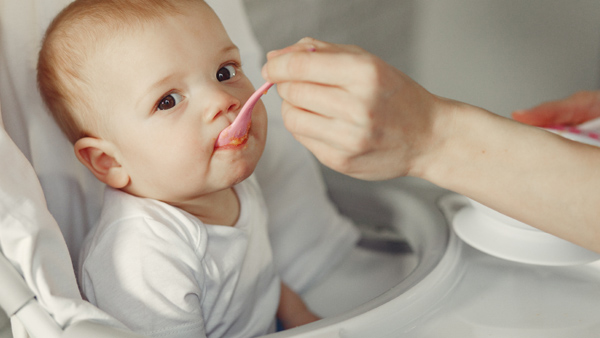Your baby needs extra fat
Young children need more fat in their food than adults. The reason is that they have a relatively high energy need, i.e. they need more energy per kilogram of body weight than an adult. At the same time, it is important not to be too generous with fats as it can lead to them getting full too quickly.
Read time: 3 m
Verified by Sara Ask
Licensed dietitian
Babies grow very fast and that's why they need so much energy. They need as much as a cyclist on the Tour de France (per kilogram of body weight, that is). An average baby grows 25 centimetres in length and triples its weight during the first year of life. Imagine what that would mean for your weight! And how much you would need to eat to get there…
Fat is the most energy-rich food substance. And oil, which consists of 100% fat, is the most energy-rich ingredient. But fat contains not only energy but also other things that are important for a growing child. Especially the so-called essential fatty acids – two fatty acids that the baby (and also the rest of us) need to get through food because the body can't produce them itself. They are called omega-3 and omega-6 and are found in ordinary rapeseed oil, among other things. About one teaspoon per serving is usually the right amount of extra fat for babies and children up to 2 years of age, provided the food they are served does not already contain extra fat. A good rule of thumb is that in total there should be no more than one tablespoon of extra oil per day. Fat is like everything else – just the right amount is best.
Maybe you've noticed how you don't feel great after a very fatty meal. What happens when you eat a lot of fat is that a hormone that makes the intestines move more slowly is released. This is so that the body has time to absorb the fat, a process that is quite advanced. You don't want your baby to feel bad halfway through the meal, so it's best to find a balance: enough fat for the food to be high in energy, but not so much that the baby can't manage to eat i. Read more about a normal portion here.
Five tips on healthy fats for both you and your baby!
- Use rapeseed oil or fat made from rapeseed oil in cooking. Rapeseed oil has a good balance between saturated and unsaturated fats and contains the two essential fatty acids, omega-3 and omega-6. Hot-pressed rapeseed oil is neutral in taste and can withstand heating well. Cold-pressed rapeseed oil has a clearer taste and is good for dressings.
- Vary with olive oil from time to time, for example when you are looking for that special olive oil taste. Although olive oil does not contain omega-3, it does provide antioxidants and is a generally healthy oil.
- Serve fish 2-3 times a week, to your baby as well. Both oily and lean fish is good. Fish not only contributes fat but also other important nutrients such as iodine, selenium and vitamin D.
- You can also give nuts and seeds to your baby – they contain good fats, protein, fibre and many other important nutrients. The important thing is not to give whole nuts and seeds, but rather chopped finely or mixed so your baby doesn't choke.
- Avocado also contains nutritious fats. The perfect snack for small mouths.
Verified by Sara Ask
Licensed dietitian
More from Preggers
Hundreds of related articles, podcasts & more waiting for you in the Preggers app.
Download Preggers today.

